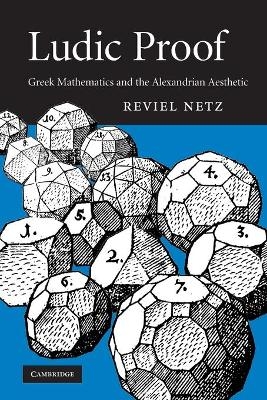
Ludic Proof
Cambridge University Press (Verlag)
978-1-009-06980-9 (ISBN)
This book represents a new departure in science studies: an analysis of a scientific style of writing, situating it within the context of the contemporary style of literature. Its philosophical significance is that it provides a novel way of making sense of the notion of a scientific style. For the first time, the Hellenistic mathematical corpus - one of the most substantial extant for the period - is placed centre-stage in the discussion of Hellenistic culture as a whole. Professor Netz argues that Hellenistic mathematical writings adopt a narrative strategy based on surprise, a compositional form based on a mosaic of apparently unrelated elements, and a carnivalesque profusion of detail. He further investigates how such stylistic preferences derive from, and throw light on, the style of Hellenistic poetry. This important book will be welcomed by all scholars of Hellenistic civilization as well as historians of ancient science and Western mathematics.
Reviel Netz is Professor of Classics at Stanford University, California. He has written many books on mathematics, history and poetry, including, most recently, The Transformation of Mathematics in the Early Mediterranean World (2004) and (with William Noel) The Archimedes Codex (2007). The Shaping of Deduction in Greek Mathematics (1999) has been variously acclaimed as 'a masterpiece' (David Sedley, Classical Review), and 'The most important work in Science Studies since Leviathan and the Air-Pump' (Bruno Latour, Social Studies of Science). Together with Nigel Wilson, he is currently editing the Archimedes Palimpsest, and he is also producing a three-volume complete translation of and commentary on the works of Archimedes.
Preface; Introduction; 1. The carnival of calculation; 2. The telling of mathematics; 3. Hybrids and mosaics; 4. The poetic interface; Conclusions and qualifications.
| Erscheinungsdatum | 16.07.2021 |
|---|---|
| Zusatzinfo | Worked examples or Exercises |
| Verlagsort | Cambridge |
| Sprache | englisch |
| Maße | 151 x 228 mm |
| Gewicht | 410 g |
| Themenwelt | Geschichte ► Allgemeine Geschichte ► Vor- und Frühgeschichte |
| Mathematik / Informatik ► Mathematik ► Geschichte der Mathematik | |
| Naturwissenschaften | |
| ISBN-10 | 1-009-06980-2 / 1009069802 |
| ISBN-13 | 978-1-009-06980-9 / 9781009069809 |
| Zustand | Neuware |
| Informationen gemäß Produktsicherheitsverordnung (GPSR) | |
| Haben Sie eine Frage zum Produkt? |
aus dem Bereich


